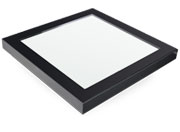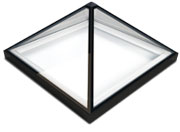The Health Benefits of Natural Daylight
As soon as the nation enjoys a spate of pleasant weather, it is clear to see the positive impact that the sunshine has on our moods.
With countless data supporting the advantages of natural daylight, we delve in and take a closer look at why natural light is proven to be more beneficial than artificial lighting.

Increase Efficiency
Ensuring the right level and quality of light can have an impact on mood and performance.
There is a significant amount of evidence linking the levels of natural lighting to improved eye and brain function. This better response to natural light leads to an improvement in performance and an increase in individuals’ success.
Staying In Synch
Our bodies require an appropriate amount of light at the correct intensity and at the right time of day to act as cues for our internal body clocks.
Whether it is light in the morning to assist us to wake up and feel energised or dimmer light in the evening to help us wind down, natural light helps our bodies stay in synch and keep our internal body.
Well-being
Exposure to sunlight has a proven ability to impact upon our well-being, making us feel a lot happier. This is due to the resulting release of the hormone serotonin.
Known as the “happy hormone”, serotonin is regarded by many health professionals as something which helps maintain mood balance. It is also thought that the hormone affects numerous other physical and mental functions including social behaviour, appetite and digestion, sleep and memory.
The Impact of Vitamin D
The main source of Vitamin D is the sun, and it is crucial for good health and well-being.
It is produced in the skin with the help of daylight and has many functions, including reducing the risk and improving resistance to disease and helping keep your immune system functioning properly.
It is also a vital hormone for growth.
Health
Seasonal Affective Disorder (SAD) is a clinically diagnosed condition whereby a lack of natural daylight makes people feel unwell.
Flooding the environment with as much natural daylight as possible helps to reduce the likelihood of an onset of this condition.
The Pitfalls Of Artificial Lighting
Too much artificial light can have a negative impact on individuals and is linked to a decrease in the hormone melatonin.
Melatonin is produced in the brain between approximately 9pm and 8am, depending on the individual’s sleep patterns. It is crucial in helping to regulate our daily body clock, and when levels of the hormone are disrupted they can affect an individual both physically and mentally.
Examples of this can include:
- Our ability to have a good night’s sleep
- How clear we’re able to think
- The timing and release of various hormones throughout the body
- The regulation of glucose and blood pressure levels
A consistent lack of sleep also increases the risk of developing more long-lasting (chronic) health conditions such as diabetes and depression.
Eco-friendly
Natural sunlight is a brighter, far cleaner and more eco-friendly source of power.
Securing a large amount of natural daylight in your homes guarantees you are not only saving money but also reducing energy consumption.
Maximising natural lighting creates a much more pleasant environment and is closely linked to health and other benefits: a sense of well-being has been proven to be related to exposure to natural daylight, as have increased productivity levels.
Bring The Outside In
Not only does the installation of rooflights in your home or workplace offer the broad scope to add style and a contemporary feel to your space; maximising natural light also has countless benefits of its own.
EOS Rooflights have the ability to capture light no matter where the sun is positioned and what time of day it is, unlike windows or vertical glazing.
Filling spaces with natural lighting certainly looks attractive, but it will also have a positive impact on the individual enjoying that space.
Contact our team
If you have any questions, would like a bespoke price or want to enquire about our installation service. Give us a call or drop an email:
![]() 0208 462 3557
0208 462 3557



